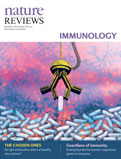|
Advertisement | ||||||||||||||||||||||||||||||||||||||||
| ||||||||||||||||||||||||||||||||||||||||
| TABLE OF CONTENTS | ||||||||||||||||||||||||||||||||||||||||
| December 2016 Volume 16 Number 12 | Advertisement | |||||||||||||||||||||||||||||||||||||||
| In this issue
|
| ||||||||||||||||||||||||||||||||||||||
| ||||||||||||||||||||||||||||||||||||||||
 | ||||||||||||||||||||||||||||||||||||||||
| Comment: Prime-boost strategies to embrace diversity and inclusion in immunology Cherie L. Butts, Irelene P. Ricks & Avery August p715 | doi:10.1038/nri.2016.122 Immunologists appreciate the need for creative approaches to tackle complex scientific questions, which can involve not only the use of novel technologies but also the experience of scientists from diverse backgrounds. Here, we highlight measures to prime for the inclusion of women and underrepresented individuals in science to boost immunology research. Abstract | Full Text | PDF | ||||||||||||||||||||||||||||||||||||||||
| ||||||||||||||||||||||||||||||||||||||||
| Advertisement | ||||||||||||||||||||||||||||||||||||||||
| ||||||||||||||||||||||||||||||||||||||||
| REVIEWS | Top | |||||||||||||||||||||||||||||||||||||||
| Immunoregulation by members of the TGFβ superfamily WanJun Chen & Peter ten Dijke p723 | doi:10.1038/nri.2016.112 In this Review, the authors discuss the emerging roles for members of the transforming growth factor-β (TGFβ) superfamily in regulating immune responses. In particular, they focus on how activin A and bone morphogenetic proteins (BMPs) regulate innate and adaptive immune cells in inflammatory diseases and cancer. Abstract | Full Text | PDF | ||||||||||||||||||||||||||||||||||||||||
| Emerging roles of p53 and other tumour-suppressor genes in immune regulation César Muñoz-Fontela, Anna Mandinova, Stuart A. Aaronson & Sam W. Lee p741 | doi:10.1038/nri.2016.99 The tumour suppressor p53 has well-known functions in cell repair and cell death that have led to its title as the 'guardian of the genome'. Here, the authors discuss the less-well appreciated roles of p53 and other tumour suppressor genes in shaping immune responses; they propose that these genes could also be considered to be 'guardians of immune integrity'. Abstract | Full Text | PDF | ||||||||||||||||||||||||||||||||||||||||
| Food allergy: immune mechanisms, diagnosis and immunotherapy Wong Yu, Deborah M. Hussey Freeland & Kari C. Nadeau p751 | doi:10.1038/nri.2016.111 Research into the immune mechanisms associated with healthy tolerance to common foods, the inflammatory response underlying food allergies, and immunotherapy-induced desensitization promises new approaches to the diagnosis, prevention and treatment of food allergy. Abstract | Full Text | PDF | ||||||||||||||||||||||||||||||||||||||||
| Advertisement | ||||||||||||||||||||||||||||||||||||||||
| ||||||||||||||||||||||||||||||||||||||||
| PERSPECTIVES | Top | |||||||||||||||||||||||||||||||||||||||
| OPINION Do antibodies select a healthy microbiota? Jason L. Kubinak & June L. Round p767 | doi:10.1038/nri.2016.114 A hypothesis is presented proposing that antibodies raised against commensal microorganisms shape the composition of the microbiota — through a process the authors call antibody-mediated immunoselection — and influence the overall health of the host. Abstract | Full Text | PDF | ||||||||||||||||||||||||||||||||||||||||
| Advertisement | ||||||||||||||||||||||||||||||||||||||||
| ||||||||||||||||||||||||||||||||||||||||
| ||||||||||||||||||||||||||||||||||||||||
| *2014 Journal Citation Report (Thomson Reuters, 2015) |
You have been sent this Table of Contents Alert because you have opted in to receive it. You can change or discontinue your e-mail alerts at any time, by modifying your preferences on your nature.com account at: www.nature.com/myaccount For further technical assistance, please contact our registration department For print subscription enquiries, please contact our subscription department For other enquiries, please contact our feedback department Nature Publishing Group | One New York Plaza, Suite 4500 | New York | NY 10004-1562 | USA Nature Publishing Group's worldwide offices: Macmillan Publishers Limited is a company incorporated in England and Wales under company number 785998 and whose registered office is located at The Campus, 4 Crinan Street, London, N1 9XW. © 2016 Nature Publishing Group, a division of Macmillan Publishers Limited. All Rights Reserved. |
 |









No comments:
Post a Comment